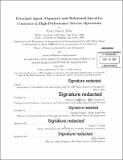| dc.contributor.advisor | Deborah Nightingale and Georgia Perakis. | en_US |
| dc.contributor.author | Doss, Ryan Garrett | en_US |
| dc.contributor.other | Leaders for Global Operations Program. | en_US |
| dc.date.accessioned | 2014-10-08T15:28:26Z | |
| dc.date.available | 2014-10-08T15:28:26Z | |
| dc.date.copyright | 2014 | en_US |
| dc.date.issued | 2014 | en_US |
| dc.identifier.uri | http://hdl.handle.net/1721.1/90776 | |
| dc.description | Thesis: S.M., Massachusetts Institute of Technology, Department of Aeronautics and Astronautics, 2014. In conjunction with the Leaders for Global Operations Program at MIT. | en_US |
| dc.description | Thesis: M.B.A., Massachusetts Institute of Technology, Sloan School of Management, 2014. In conjunction with the Leaders for Global Operations Program at MIT. | en_US |
| dc.description | Cataloged from PDF version of thesis. | en_US |
| dc.description | Includes bibliographical references (pages 126-127). | en_US |
| dc.description.abstract | This thesis focuses on the creation of a high-performance service operations organization. As organizations increasingly compete on service quality, increased attention has been given to measuring, tracking, and improving customer satisfaction. This thesis 1) provides a novel framework for service quality improvement and 2) explores concepts in game theory, relational contracts, and incentive mechanism design that impact service quality in the modern organization. The framework introduced in this thesis is comprised of four distinct steps. In the first step, service quality is quantitatively measured and drivers of service quality are determined both through qualitative methods and through statistical analysis on a customer-by- customer basis. In the second step, key drivers of service quality are addressed through process redesign and operational improvement. In the third step, the alignment of service operations incentive mechanisms with employee behavior consistent with high service quality is analyzed and considered in the context of building a high-performance service organization. Finally, the role of organizational learning and the relational contracts that may help to sustain a culture of experimentation, learning, and improvement are considered. These concepts are applied to a host organization, Atlantic Energy, by way of case study throughout this thesis; this acts to provide a concrete example of the application of these concepts and shows an example of the effectiveness of the framework when compared to traditional methods in service operations improvement. | en_US |
| dc.description.statementofresponsibility | by Ryan Garrett Doss. | en_US |
| dc.format.extent | 127 pages | en_US |
| dc.language.iso | eng | en_US |
| dc.publisher | Massachusetts Institute of Technology | en_US |
| dc.rights | M.I.T. theses are protected by copyright. They may be viewed from this source for any purpose, but reproduction or distribution in any format is prohibited without written permission. See provided URL for inquiries about permission. | en_US |
| dc.rights.uri | http://dspace.mit.edu/handle/1721.1/7582 | en_US |
| dc.subject | Aeronautics and Astronautics. | en_US |
| dc.subject | Sloan School of Management. | en_US |
| dc.subject | Leaders for Global Operations Program. | en_US |
| dc.title | Principal-agent alignment and relational incentive contracts in high-performance service operations | en_US |
| dc.type | Thesis | en_US |
| dc.description.degree | S.M. | en_US |
| dc.description.degree | M.B.A. | en_US |
| dc.contributor.department | Leaders for Global Operations Program at MIT | en_US |
| dc.contributor.department | Massachusetts Institute of Technology. Department of Aeronautics and Astronautics | |
| dc.contributor.department | Sloan School of Management | |
| dc.identifier.oclc | 891566491 | en_US |
